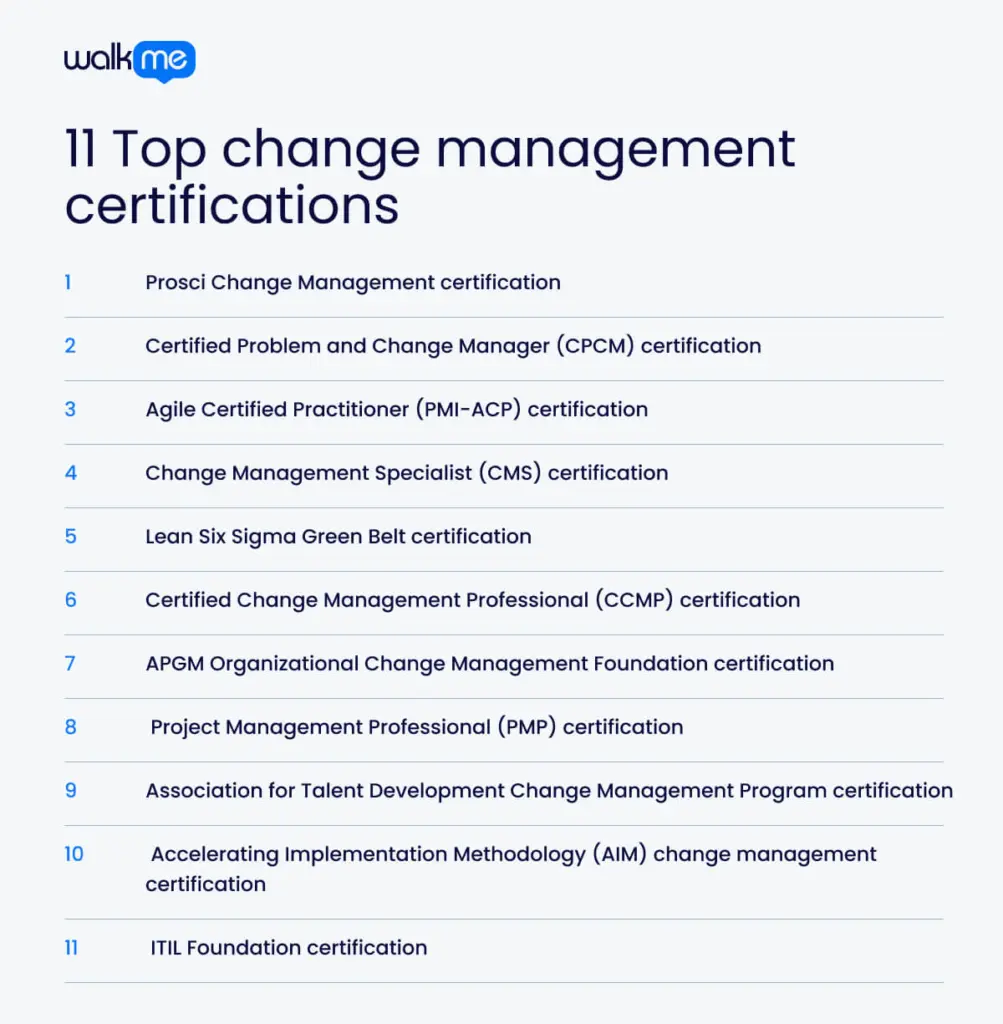Organizational change requires expertise. As businesses evolve, the demand for skilled change management professionals grows.
Change management certifications equip leaders with tools to guide their organizations through transitions. These credentials validate one’s ability to implement effective change strategies.
Just one in three major change projects fully achieves organizational goals, highlighting the need for certified change management professionals.

But which certifications hold the most value?
The answer varies depending on industry and organizational needs. Some companies prioritize certified staff, while others focus on practical experience.

This article explores the top eleven change management certifications, offering insights into their benefits and relevance.
1. Prosci Change Management certification
- Entry: No prior experience needed
- Cost: $3,750 to $4,250 for full training
- Time: 3-day intensive course
- Upkeep: Update skills every 3 years
- Best for: Change agents, project managers, HR experts
Prosci is a big name in change management. Their program uses the ADKAR model and offers practical tools for successful change.
Students learn to use Prosci’s research-based methods in real situations. This includes managing stakeholders, planning communication, and handling resistance.
2. Certified Problem and Change Manager (CPCM) certification
- Entry: Two years of management experience suggested
- Cost: About $450 for the exam
- Time: Self-paced study, 2.5-hour exam
- Upkeep: 50 pro dev units every three years
- Best for: Managers, consultants, change specialists
The GAQM offers this certificate. It mixes problem-solving with change management. It teaches how to spot, study, and fix business issues while managing change.
The program covers problem-solving methods, change models, and how to lead teams through changes.
3. Agile Certified Practitioner (PMI-ACP) certification
- Entry: 2,000 hours of project work, 1,500 hours on agile teams
- Cost: $495 for PMI members, $645 for non-members
- Time: Self-paced study, 3.5-hour exam
- Upkeep: 30 PDUs in agile topics every three years
- Best for: Project managers, scrum masters, agile team leaders
While not just for change management, the PMI-ACP helps change managers in Agile settings.
It shows you can use Agile principles, which involve constant change. The cert covers Scrum, Kanban, and Lean, which are useful for managing change in fast-paced projects.
4. Change Management Specialist (CMS) certification
- Entry: Basic grasp of how businesses work
- Cost: $299 for the exam Time: Self-paced study, 2.5-hour exam
- Upkeep: Recertify every four years
- Best for: HR pros, project managers, org development specialists
The Management and Strategy Institute offers this cert. It gives a broad view of change management ideas and practices.
It covers types of change, dealing with resistance, communication strategies, and change leadership. It’s good for newcomers or those formalizing their knowledge.
5. Lean Six Sigma Green Belt certification
- Entry: Basic understanding of process improvement
- Cost: $1,500 to $5,500 (varies by provider)
- Time: 2-3 weeks of training, plus project work
- Upkeep: Varies, typically every three years
- Best for: Process improvement specialists, project managers, quality pros
This Green Belt Certification focuses on process improvement but applies to change management. It teaches how to drive change through data-driven improvements.
Green Belts learn to lead small projects, use stats for business problems, and guide teams through change.
6. Certified Change Management Professional (CCMP) certification
- Entry: 3 years of change management work, 21 hours of training
- Cost: $645 for ACMP members, $795 for non-members
- Time: Self-paced study, 3.5-hour exam
- Upkeep: 60 PDUs every three years
- Best for: Experienced change practitioners, consultants, senior project managers
The ACMP offers this respected certification based on the ACMP Standard for Change Management and Code of Ethics.
It covers stakeholder engagement, change strategy, and aligning organizations.
7. APGM Organizational Change Management Foundation certification
- Entry: No prior experience needed
- Cost: About $550 for training and exam
- Time: 2.5 days of training, 1-hour exam
- Upkeep: No renewal needed
- Best for: Project managers, team leaders, change management beginners
APMG International offers this certificate. It teaches the basics of organizational change management.
The program covers key ideas like stakeholder engagement, communication strategies, and assessing change impact. It gives a broad view of change frameworks and their use.
8. Project Management Professional (PMP) certification
- Entry: 35 hours of project management education, 4,500 hours leading projects
- Cost: $555 for PMI members, $705 for non-members
- Time: Self-paced study, 4-hour exam
- Upkeep: 60 PDUs every three years
- Best for: Project managers, program managers, change leaders
The PMP Certification includes extensive information about managing change in project settings.
PMP-certified pros are skilled in stakeholder management, communication, and leading teams through changes. The latest exam focuses more on agile and hybrid approaches, which align with modern change management.
9. Association for Talent Development Change Management Program certification
- Entry: Basic understanding of organizational development
- Cost: $1,495 for ATD members, $1,745 for non-members
- Time: 2.5 days (instructor-led) or self-paced online
- Upkeep: No formal renewal process
- Best for: HR professionals, L&D specialists, OD consultants
This ATD Program focuses on the human side of change management.
It teaches how to manage people during changes, including building resilience, creating communication plans, and developing change champions.
10. Accelerating Implementation Methodology (AIM) change management certification
- Entry: Familiarity with change management concepts
- Cost: $2,500 to $3,500 for training
- Time: 3.5-day intensive program
- Upkeep: Refresher course suggested every two years
- Best for: Change practitioners, project managers, organizational leaders
Implementation Management Associates offers this certification. It provides a structured approach to complex changes.
The program focuses on practical tools to speed up change adoption. Participants learn to reduce resistance, build change agent networks, and create targeted communication plans.
11. ITIL Foundation certification
- Entry: Basic IT knowledge helpful
- Cost: About $350 for exam
- Time: 2-3 days of training, 1.5-hour exam
- Upkeep: No renewal needed, but higher levels are available
- Best for: IT professionals, service management specialists, business-IT alignment roles
While focused on IT service management, this certificate includes change management in IT settings.
It covers change assessment, planning, and implementation. The cert provides a structured approach to managing IT changes, which is vital for digital transformations.
Navigating a career in change management requires a strategic approach to learning and certification.
The right credentials can enhance each step in your journey. As you progress, consider how different certifications align with your goals and industry needs.
Foundational certifications like CMS or APGM can provide a solid starting point early in your career. As you gain experience, specialized certifications like Prosci or CCMP can deepen your expertise. For those in tech-heavy industries, ITIL or PMI-ACP might be more valuable.
Remember, it’s not about collecting badges but building a toolkit for your unique career path. For the best results, combine certifications with real-world experience.
Stay flexible and keep learning. The field of change management is always evolving, and your career should, too.
FAQs
A change management certification proves a person’s skills in handling business change. Well-known groups in the field offer these certifications. Change management certifications often cover change theories and models, ways to plan and carry out change, how to deal with pushback, methods to involve and talk to stakeholders, and tools to check if change efforts work.
To get certified, you must pass a test and show real-world experience. The depth of knowledge needed varies by certification level and provider.
Change management certifications create a shared knowledge base among professionals, helping everyone speak the same language. People with these certificates can help their companies handle big changes better and become more adaptable. Lastly, certified professionals are good at spotting and lowering risks during changes, saving companies time and money.
A change management certification boosts your reputation, especially as the field grows. Judging change management skills is often subjective, but a qualification shows proficiency. Accreditation strengthens your candidature and improves your job prospects. Most organizations will see your certification as a valuable asset.

